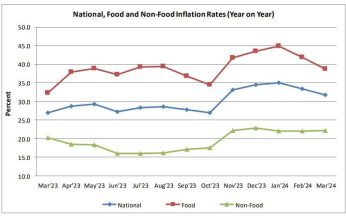40% of Lilongwe workforce in informal sector
 Forty percent of Lilongwe City Council (LCC) workforce is in the informal sector, a trend that will continue to rise as urbanisation gathers pace, Secretary for Local Government Stuart Ligomeka has said.
Forty percent of Lilongwe City Council (LCC) workforce is in the informal sector, a trend that will continue to rise as urbanisation gathers pace, Secretary for Local Government Stuart Ligomeka has said.
Speaking last week during the opening of the Lilongwe City Development Strategy Review at Crossroads Hotel, Ligomeka said within the next 10 years, 60 percent of the world’s population will live in urban areas and Malawi will not be spared of this phenomenon.
“The population of the city of Lilongwe rises to one million during the day from 647 000 at night because people are looking for services in the city. Forty percent of the workers are in the informal sector and it is imperative that the city must create jobs for its residents,†he said.
Ligomeka said a sustainable city must enable access to land, affordable housing and provide adequate space for the community to develop social capital.
He noted that a sustainable city must also provide hope for a better life to the poor and the most vulnerable, secure their livelihoods, find decent and affordable housing and access to social services.
LCC acting chief executive officer Vito Mulula said the observations that urbanisation is rising at a faster pace compelled them to come up with a master plan.
“This plan will guide us on how we develop the city. We plan to decongest the city and make the use of a car as a luxury. We will encourage investors to invest in locations and areas so that our CBD [central business district] is decongested,†he said.
Sara Hoeflick De Duque, programme manager for the United Cities in Local Government, who attended the workshop, encouraged the government of Malawi to empowers city councils so that development can be coordinated from the grassroots.
“Local democracy and local governance will greatly help the city grow as it is a way of empowering the locals. Sometimes cities can better manage development activities than the national government and with urbanisation growing very fast assemblies must be fully empowered by holding local government elections in 2014,†said de Duque.





